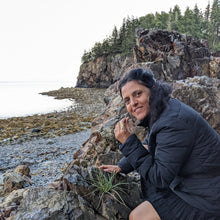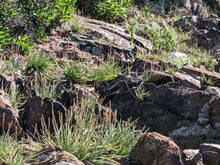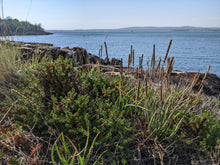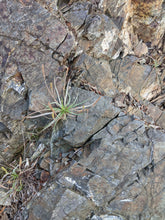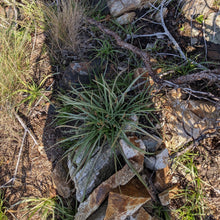'Owl's Head' Sea Plantain
Regular price
$4.25
Sale
Plantago maritima
Origin: Owl's Head, Maine
Improvement status: Wild
Seeds per packet: ~50
BOTANICAL SAMPLE - NOT GERMINATION TESTED
Life cycle: Perennial
EFN INTRODUCTION. Sea Plantain (Plantago maritima) is a wild perennial vegetable that inhabits maritime environments in temperate to cold climates, rarely found growing more than a few feet from the high-tide line. But it's so resilient it can even thrive well below the high-tide line, getting swamped by seawater for multiple hours twice a day. It can handle being watered with saltwater. It also has a similar nutritional and medicinal profile to the other plantains, which means it's a powerhouse. But the best thing about it is its quality as food.
I've put a lot of plantain in my mouth through the years — especially the common wild species, Plantago major and Plantago lanceolata, which I often chew up and apply to insect bites or other skin irritations — but none compare to sea plantain. Crunchy, fleshy, salty, fresh and vibrant, it's easy to start munching on this plant by the handful. There's really nothing like it. It can be cooked or pickled too. Some plants have a bit of bitterness, and occasionally some astringency too, but not all of them. And none are as bitter as the buckshorn plantain (Plantago coronopus) which people regularly grow in gardens as food. What's more, the fleshy leaves can stay crunchy and delicious without refrigeration for 4 or 5 days — a remarkable quality in any vegetable, but especially one used as a green.
This perennial wild plant has huge potential as a perennial vegetable. Beyond being nutritious, delicious, and easy to grow (if it can be protected from rabbits!), it can also thrive in saline soils, which the world has lots of these days due to both over-irrigation and seawater incursion (both exacerbated by climate change). This population comes from the spectacular area around Owl's Head, Maine, where beautiful pine forests and rocky cliffs meet the crashing surf. Sea plantain plants can be found at Owl's Head competing for space on the cliff-tops with another of our favorite native perennials — the black crowberry (Empetrum nigrum) — which we hope to have in the catalogue someday. The Owl's Head sea plantain population is by far the most rugged of the ones we've encountered. While places like Searsport and Pumpkin Knob are in relatively protected coves, Owl's Head is much more exposed. As a result, the plants are only growing at the tops of the cliffs or on boulders above the normal high tide line. They're never at the water's edge, where intense wave action would wash them away. So whether it's a manifestation of genetics or environment, the plants at Owl's Head are a bit more compact than others (though plenty still have nice thick strappy leaves. We assume they're likely to be highly drought tolerant — because they're growing out of rocks that only get really wet when it rains — and probably more resilient in general. Plenty of the plants were crunchy and delicious. We're beyond curious ourselves about how this population will fare once we try it in good garden soil!
By putting these seeds out into the world, we're hoping to start a collaborative domestication project that could one day result in the best-tasting perennial green in the world.
Who's in?!
(To stay in touch on this effort, please join our project page on www.ExperimentalFarmNetwork.org. And check out the other five sea plantain lots we're offering this year!)
GROWING TIPS: We've had good success starting sea plantain in flats or pots in good seed-starting mix (peat & perlite). You might try adding some sand if you have around. Seedlings start very small, but size up quickly once they get going. Can be transplanted to anywhere with good garden soil — but be sure to protect them from critters! Sea plantain is so delicious it's hard to keep the rabbits and groundhogs at bay!






